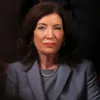King Charles has used his opening speech to the Commonwealth Heads of Government Meeting (CHOGM) to warn against the “existential” threat of climate change, encouraging all 56 member states gathered in Samoa to do everything possible to cut emissions.
The commonwealth’s ranks are dominated by small and developing countries across Africa, South Asia, the Caribbean and the Pacific, and many have been pressing wealthier countries to ramp up climate finance to help them deal with the threat.
King Charles has a long record of advocacy on climate change, although he’s tempered his language since ascending to the throne.
Climate issues are set to dominate the summit. (Reuters: Ian Vogler/Pool)
He told the official opening of CHOGM that humanity needed to “forge a future of harmony with nature and between ourselves” and that leaders had raised the issue with him “again and again”.
“This year alone we have seen terrifying storms in the Caribbean, devastating flooding in East Africa and catastrophic wildfires in Canada,” he said.
“I can only offer every encouragement for action with unequivocal determination to arrest rising temperatures by cutting emissions, building resilience as far as possible to both the current and forecast impacts of climate change, and conserving and restoring nature both on land and in the sea.”
The king also warned that climate change was undermining development progress, and exacerbating inequalities between wealthy and developing nations across the commonwealth.
King Charles drank from a cup of kava, locally known as “ava”, during a ceremony in Samoa on Thursday. (Reuters: Victoria Jones/Pool)
Nations push for climate action, reparations for colonialism
Samoa’s Prime Minister, Fiame Naomi Mata’afa, said hosting CHOGM would help her country draw attention to the profound climate risks her country was facing.
“Our strength lies in spotlighting issues that might otherwise be overlooked. The hosting of CHOGM 2024 in the Pacific is a great opportunity for all to experience our lived reality,” she said.
Samoa’s prime minister Fiame Naomi Mata’afa. (Reuters: Chris Jackson/Pool)
“Especially with climate change. It is the greatest threat to the survival and security of our Pacific people.”
Ahead of the summit, Tuvalu’s Prime Minister Feleti Teo also pressed Australia over fossil fuel exports, suggesting it was inconsistent with the Falepili Union he ratified earlier this year with Prime Minister Anthony Albanese.
But Mr Albanese told reporters in Apia that Australia recognised climate change presented an “existential challenge” to the region, insisting he would have “positive discussions” with Prime Minister Teo and other Pacific leaders.
“They recognise that the challenge of climate change doesn’t mean that you can just flick a switch and act immediately,” he said.
“We need to make sure that energy security is prioritised.”
While the Pacific is sharply focused on climate, some commonwealth countries are still pushing for a discussion on reparations — or other forms of reparatory justice — for colonialism and slavery.
The United Kingdom’s Prime Minister Keir Starmer has already ruled out either reparations or a formal apology for slavery.
King Charles made only a veiled reference to colonialism in his speech, saying “our cohesion requires that we acknowledge where we have come from.”
“I understand from listening to people across the commonwealth how the most painful aspects of our past continue to resonate,” he said.
“It is vital, therefore, that we understand our history, to guide us towards making the right choices in future where inequality exists.”
But some African and Caribbean nations are still pressing the UK to open discussions on reparations.
Anthony Albanese and British Prime Minister Keir Starmer had a bilateral meeting during CHOGM. (Reuters: Stefan Rousseau/Pool)
The BBC has reported that a draft of the summit communique which leaders will issue tomorrow will “note” calls for “discussions on reparatory justice”.
The draft communique also reportedly says that commonwealth leaders would play “an active role in bringing about such inclusive conversations addressing these harms” and agree “to prioritise and facilitate further and additional research” on the slave trade to help “inform a way forward.”
Commonwealth secretary-general Patricia Scotland said that the issue was “not on the formal agenda” at CHOGM, but said if leaders “wanted to discuss it, they would.”
“Our leaders, when they come together, have always been able to talk about any issue that’s important to them,” she said.
Loading YouTube content


